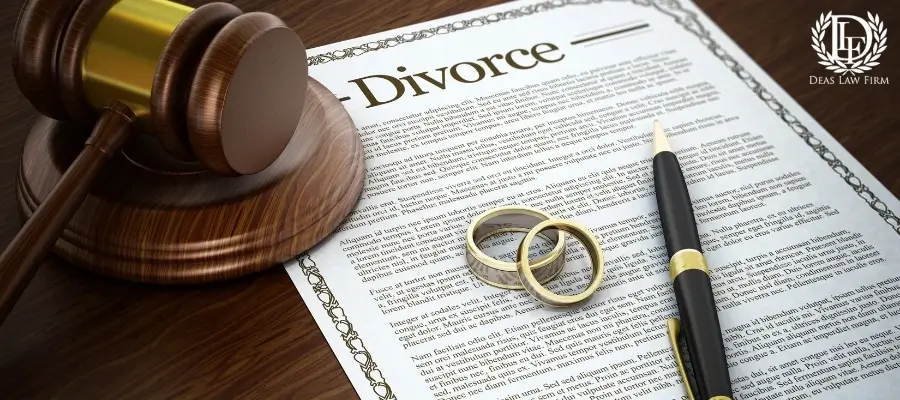Manning Divorce Lawyer

Manning Divorce Attorney
Like other legal matters in South Carolina, there is an established process when it comes to filing for divorce. Each family will have individual needs, but the process is similar for all divorce cases. If you are considering a divorce, hire a Manning divorce lawyer at Deas Law Firm who can guide you through the process of determining your family’s needs and help you protect your rights and interests in the settlement.
Our family law attorneys have handled thousands of divorce cases in the Manning area and are ready to put their skills, resources, and experience to work tirelessly to advocate for you. Whether that means mediation, negotiating the terms of the settlement, or advocating for you in court, your divorce attorney can help make sure you get the most favorable outcome possible in your case.
Requirements for South Carolina Divorce
At least one spouse has to be a South Carolina resident to seek a divorce. If both parties are living in South Carolina, one has to be a state resident for a minimum of 90 days before they can file for divorce. If only one party lives in South Carolina and the other spouse lives in another state, the spouse who files has to live in South Carolina for at least a year to be eligible for divorce.
South Carolina recognizes no-fault divorces as well as fault-based divorces under certain circumstances. For a no-fault divorce, the spouses have to live separately without being in a relationship for a year to be eligible to file for divorce.
For a fault-based divorce, the spouses don’t necessarily have to live separately for a year, but the spouse who files has to show the other spouse is at fault for the marriage ending due to adultery, physical abuse, substance abuse, or desertion.
South Carolina Divorce Process
In South Carolina, there is a standard legal process for divorce cases. The main goals of a divorce are to divide property fairly, make decisions about how to care for the children of the marriage, and determine if either spouse needs financial support, also called alimony.
The process starts by filing a complaint with the family court and serving the complaint to your spouse. Both spouses often have to submit financial disclosures, and they may negotiate property division and alimony.
When an agreement has been reached on all the terms of the divorce, the court holds a final hearing and then issues a final order of divorce. This is the end of the divorce process.
According to the US Census Bureau, South Carolina ranks fourth highest in the United States for marriages at 20.6 per 1,000 women and 24th in divorce at 9.1 per 1,000 women. This compares to the national average of 16.7 marriages per 1,000 women and 7.1 divorces per 1,000 women.
South Carolina Property Division and Alimony
In Manning and other areas of South Carolina, marital property includes any assets and debts acquired by either spouse during the marriage. When spouses divorce, marital property is distributed equitably, which means everything is divided fairly but not necessarily equally. The courts make this determination based on the length of the marriage, each spouse’s contributions to the household, and the economic circumstances of each spouse.
Similarly, a lower-earning spouse can request alimony. If the court determines alimony is needed, the higher earnings spouse will be responsible for providing financial support through one-time, temporary, or long-term payments. It is important to note that not every divorce includes alimony.
FAQs About Manning, SC Divorce Laws
How Long Do You Have to Be Separated in Manning Before a Divorce?
In most divorce cases in Manning, spouses have to be separated for a year before they are eligible to file for divorce. This generally means living in separate homes and no longer living as a married couple.
However, South Carolina courts also recognize a fault-based divorce under some circumstances, and in such cases, there may not be the same requirement for living apart for a year. Your divorce lawyer can determine when you are eligible to file for your divorce.
How Many Years Do You Have to Be Married to Get Alimony in South Carolina?
There is no specific number of years you have to be married to get alimony in South Carolina. However, the length of a marriage is one of the very important factors that a judge takes into consideration when determining alimony. Alimony is more likely to be awarded in cases where the spouses were married for a longer period. If you have questions about alimony in your specific case, be sure to bring it up to your divorce attorney.
Is Emotional Abuse Grounds for Divorce in South Carolina?
Emotional abuse is not considered one of the grounds for a fault-based divorce in South Carolina. However, if there are other issues present, such as alcohol or drug abuse, they may be grounds for a fault-based divorce. It is also important to note that most divorces in South Carolina are no-fault divorces, meaning that the spouses only have to live separately for one year to be eligible for divorce, and no additional reason is needed to file.
Who Keeps the House in a Divorce in Manning?
There is no rule that states which spouse keeps the house in a divorce in Manning. This, along with the division of other marital property, varies from case to case and depends on the circumstances of the spouses. Factors include each spouse’s income, contribution to the marriage, including unpaid labor such as raising children, and individual financial situation. Your lawyer can help determine what your options are in your particular case.
Hire a Manning Divorce Lawyer Today
Deas Law Firm has been providing top-quality legal representation to the Manning area for more than 20 years. If you are facing divorce, you don’t have to handle it alone. Our committed divorce lawyers have the skills and experience to help you through the process and give you the highest possible chance of getting your desired outcome. Reach out to our office today to set up an initial consultation and learn how our divorce lawyers can help in your case.
Contact Deas Law Firm Today
At Deas Law Firm, we work tirelessly for you to make sure you are fairly compensated on your personal injury case. From slip and fall cases or even catastrophic injury cases, Deas Law Firm is ready to fight for you and your rights. Call us today or fill out the online form to discuss your personal injury case.

Schedule your free consultation today by calling (803) 775-7004 or by filling out our online form.
Contact Us Today
Ready To Speak With An Attorney?
Fields marked with an * are required
"*" indicates required fields


